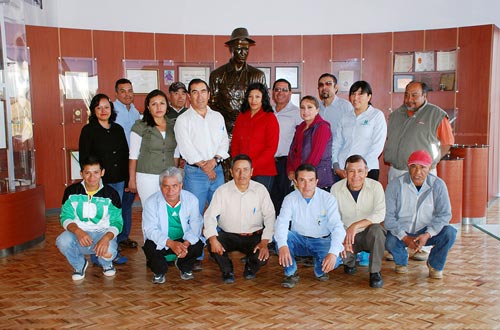By Brenna Goth and Maria Concepción Castro/CIMMYT
CIMMYT maize breeder José Luis Torres said he is driven by a strong passion for his work.

Last week marked 29 years since Torres, principal researcher for the Global Maize Program, first came to CIMMYT as a 21-year-old agronomy engineer. Since then, he has helped transform maize breeding in Mexico’s highland valleys, learned from a World Food Prize winner and earned a Ph.D. He’s not here for the salary but the dynamic work environment and a desire to “improve plants and improve people,” he said.
Torres’ interest in maize comes from its importance as a staple food for Mexicans, he said. He researched dwarf maize while studying agronomy at the Antonio Narro Agrarian Autonomous University and came to CIMMYT as a research assistant for the maize program under the late Hugo Córdova. His passion for improving the crop comes from working in the field. Direct observation leads to solutions, Torres said. “You will learn quickly,” he said, adding that he leads his team with this attitude.
Days spent in Mexico’s highland valleys led Torres, who is originally from Coahuila, Mexico, to contribute to a maize “boom” in the area, he said. The crop was rustic and unsightly when Torres first started, but his team, which included Córdova, World Food Prize winner Surinder Vasal and Jim Lothrop, changed its architecture. The researchers implemented “family planning,” a process of eliminating maize offspring to reduce competition between plants. The changes made maize lower in stature, allowed it to mature earlier and enabled seeding two cycles per year. Since then, Torres has used a range of improvement techniques, from traditional approaches to molecular biology and doubled haploid technology.
His team has released 32 CIMMYT maize lines. This year, 12 lines will be released, including blue maize lines for the first time. Blue maize contains antioxidants and could benefit poor farmers, Torres said. His team continues to develop hybrids that can easily be harvested by mechanical means and allow more plants to grow in the same area. Torres also focuses on the “improving people” aspect of his work philosophy. He leads a team of two engineers, five permanent employees and about 10 temporary workers.
Torres, who came to CIMMYT with an undergraduate degree and has since earned a Ph.D., wants to support others in furthering their education, he said. He also encourages young scientists to leave the computer and get out into the elements. Torres attributes his success to observation and experimentation – not “cyberbreeding,” he said. He also recognized the support of his team and the Global Maize Program. “It’s a lot of work,” Torres said of his job. “But it’s a personal challenge.”
 Nutrition, health and food security
Nutrition, health and food security